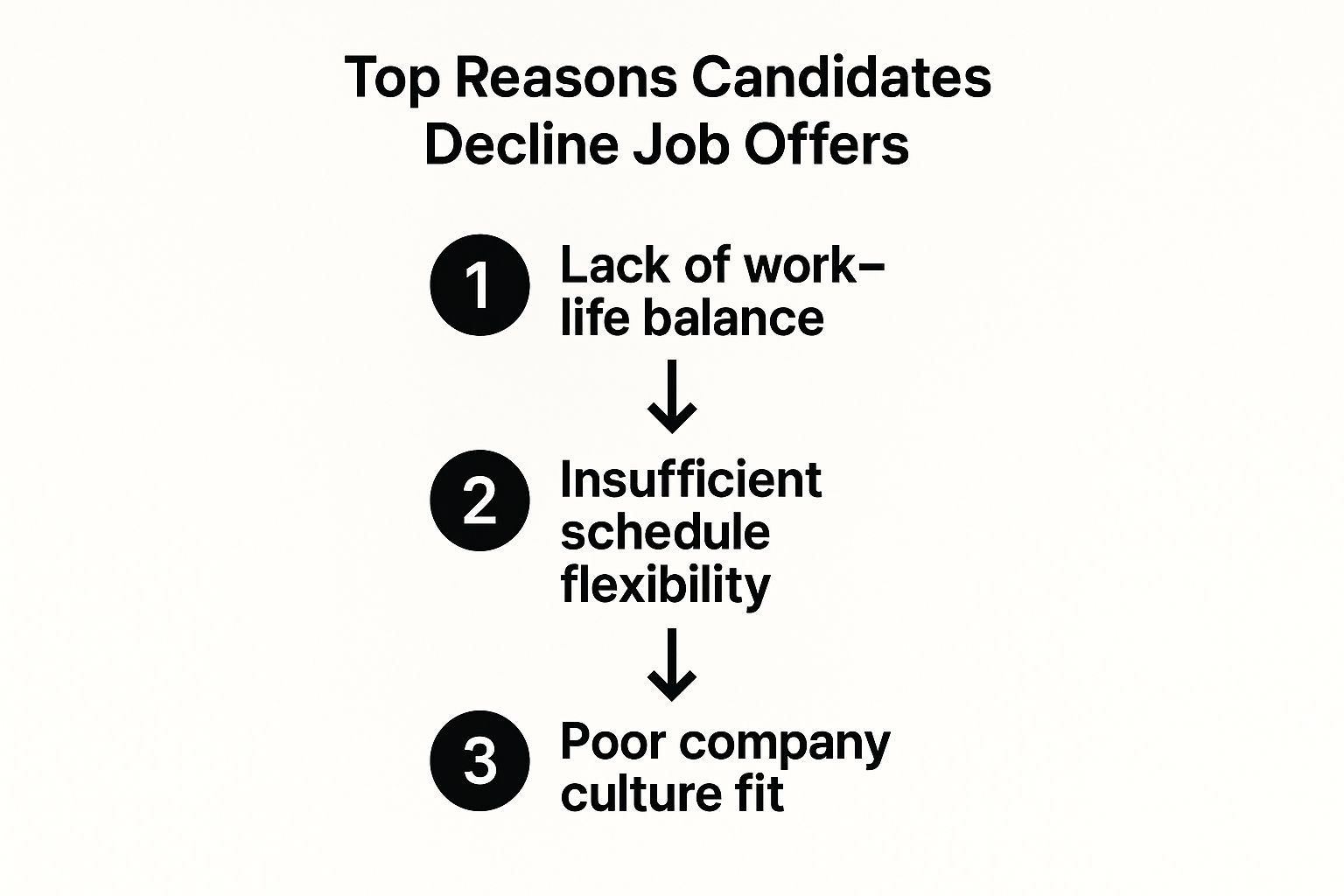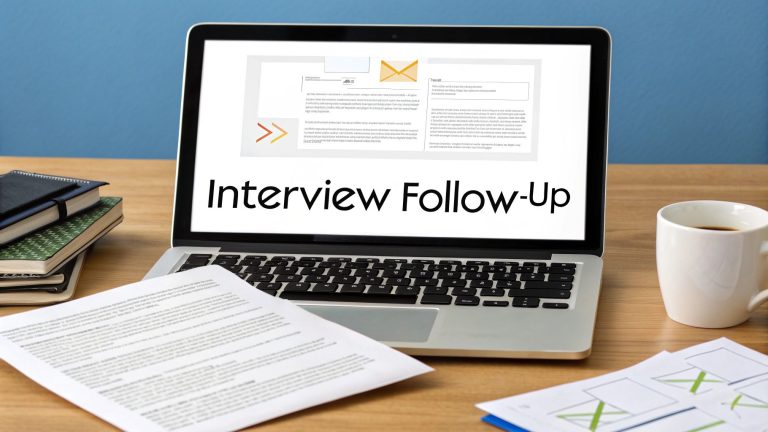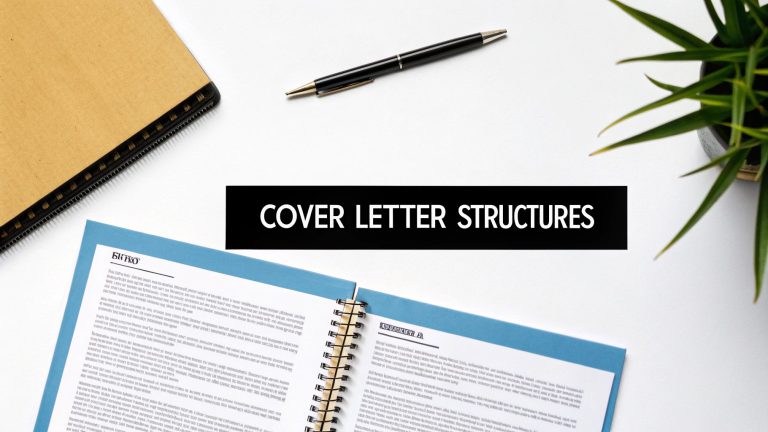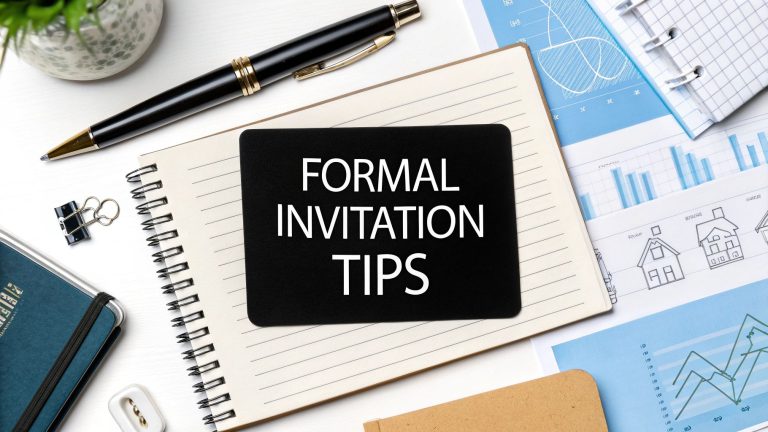Turning down a job offer is a normal part of building a career, and handling it well is crucial. The best way to do it? Be prompt, polite, and professional. A quick, thoughtful email is all you need to show your gratitude, clearly state your decision, and keep the door open for the future. This approach helps you maintain a positive relationship, even when you’re saying “no.”
Why Saying No The Right Way Matters
Let’s be honest, turning down a job offer can feel a little awkward. But it’s a completely normal part of the hiring game. In fact, you’re in good company. In the United States, the job offer acceptance rate hovers around 79%, which means nearly one out of every five candidates declines an offer they get. It’s a clear sign that professionals are carefully weighing their options before making a final decision.

How you handle this moment speaks volumes about your professionalism and can genuinely impact your career down the road. You’d be surprised how small some industries are—the recruiter or hiring manager you’re talking to today could be a key contact for another dream job tomorrow.
A graceful decline really does a few important things for you:
- It protects your professional reputation. A thoughtful, respectful “no” leaves a lasting positive impression.
- It keeps future opportunities alive. The company might have other roles down the line that are a much better fit, and a good final interaction makes them far more likely to think of you again.
- It respects everyone’s time. A prompt response lets the company move on to its other candidates without any unnecessary delays.
The core of a good rejection is respect. You’re not just turning down a job; you’re managing a professional relationship. A few minutes spent crafting a considerate message can pay dividends for years to come.
To help you get this right every time, here’s a quick summary of the essentials.
Quick Guide for Declining an Offer
| Action | Why It Matters for Your Career |
|---|---|
| Be Prompt | Responding quickly shows respect for the hiring team’s time. |
| Show Gratitude | Always thank them for the offer and their time; it shows class. |
| Be Clear but Brief | State your decision directly without over-explaining. |
| Keep it Positive | Leave a good final impression to keep the door open for the future. |
Ultimately, knowing how to decline a job offer is a vital professional skill. It shows you’re a strong communicator who understands professional courtesy. This is all part of building and maintaining your network for the long haul. You can also explore strategies for job seekers to connect with hiring managers to keep strengthening those connections.
For more general advice on professional correspondence, take a look at our guide on https://lettergenerator.co/letter-writing-etiquette-dos-and-donts/.
Why Candidates Are Declining Job Offers Today
To understand how to say ‘no’ gracefully, it helps to first understand why so many people are turning down offers these days. The reasons have really shifted. It’s no longer just about the number on the contract; people are looking at the whole picture and how a job will fit into their life.
What we’re seeing now is a huge emphasis on work-life balance and a real need for flexibility. A great title and a corner office don’t mean much if the role demands you’re always on, with zero wiggle room in your schedule. Top talent, especially from younger generations, is more than willing to walk away from that kind of setup.
Flexibility Isn’t a Perk Anymore
Flexible work arrangements have gone from a “nice-to-have” to a dealbreaker for a massive chunk of the workforce. Think about this: a whopping 72% of Gen Z workers have either turned down or seriously thought about turning down a job because it didn’t offer flexibility.
That number tells a clear story. Autonomy, the freedom to manage your own time, and not being chained to a specific location are huge factors in career choices today. The old-school, rigid 9-to-5 is quickly becoming a liability for companies that want to attract the best people. If you want to dive deeper, you can learn more about how Gen Z prioritizes flexibility.
This infographic really puts the top reasons for declining an offer into perspective.

As you can see, things like work-life balance and company culture are right up there, often carrying more weight than the salary itself.
Other Common Reasons for Saying No
Beyond the big themes of culture and flexibility, there are a few classic reasons people decide to pass on an offer. Seeing if yours fits into one of these categories can help you get clear on your own decision.
- A better offer came along. It’s the most straightforward reason. Another company simply put a more attractive package on the table—maybe better pay, stronger benefits, or just a role that feels like a perfect fit for your skills.
- Your current job made a counter-offer. Sometimes, the thought of you leaving is enough for your current employer to step up. They might offer a promotion, a big raise, or the new project you’ve been asking for, making it tough to leave.
- The role doesn’t align with your long-term goals. After all the interviews and conversations, you might just have a gut feeling. You realize that, while it’s a good job, it’s not the right next step for where you want to go in your career.
Whatever your reason for declining, it’s valid. The “why” is less important than how you communicate it. When you’re confident in your decision, it’s much easier to deliver the news professionally and graciously.
How to Write the Perfect Rejection Email
Turning down a job offer can feel awkward, but handling it with grace is a crucial professional skill. Your goal is to be clear and direct without burning any bridges. Think of it this way: you’re not just rejecting a job; you’re preserving a potentially valuable connection for the future.

The key is to keep it simple. A straightforward structure works best: a clear subject line, a note of thanks, your direct decision, and a warm closing. You don’t need to write a novel—just be polite and to the point.
Building Your Email Structure
First things first, nail the subject line. You want the hiring manager to know exactly what the email is about at a glance. Something like “Job Offer – [Your Name]” or “Regarding the [Position Title] Offer” is perfect. No guesswork needed.
Open the email by expressing genuine appreciation. A simple “thank you” goes a long way. Mention the specific job title and thank them for their time and for extending the offer. This small act of courtesy acknowledges the effort they put into the interview process and sets a respectful tone.
The best rejection emails feel less like a closed door and more like a “not right now.” Your tone should be appreciative and forward-looking, preserving the relationship you’ve built.
After your thank you, it’s time to state your decision. Be direct but polite. You can then add a very brief, professional reason for declining. Maybe you’ve accepted a role that’s a better match for your career goals, or perhaps you’ve realized this specific position isn’t the right fit. Honesty without oversharing is the sweet spot.
Sample Email Templates You Can Adapt
Here are a couple of examples to get you started. The most important thing is to personalize them so they sound like you and reflect your actual experience with the company.
Example 1: Declining for Another Opportunity
- Subject: Job Offer – Your Name
- Body: Dear [Hiring Manager’s Name], Thank you so much for offering me the [Position Title] role. I sincerely appreciate you taking the time to speak with me about this opportunity. After careful consideration, I have decided to accept another position that aligns more closely with my long-term career goals. I truly enjoyed learning about your team and wish you all the best in finding a suitable candidate.
Example 2: Declining Because It’s Not the Right Fit
- Subject: Regarding the [Position Title] Offer
- Body: Dear [Hiring Manager’s Name], Thank you again for the generous offer for the [Position Title] position. While I was very impressed with [Company Name], I have decided to decline at this time as I don’t believe the role is the best fit for my skills and aspirations. I hope our paths cross again in the future.
While this guide zeroes in on turning down an offer, getting comfortable with all hiring-related communication is a smart move. You can explore other professional message samples for communicating with hiring managers to polish your skills. Likewise, if you’re looking for pointers on other job-search correspondence, this email after interview sample has some great tips.
Navigating Difficult Rejection Scenarios
Knowing how to say “no, thank you” to a job offer isn’t always straightforward. Some situations are just plain tricky and require a bit more finesse to avoid burning bridges or making things awkward. Whether you’re dealing with a pushy hiring manager or turning down an internal promotion, you’ll need a steady, graceful approach.
The secret is staying polite, professional, and consistent. A calm, clear response will get you through even the most uncomfortable conversations with your professional reputation intact.
When the Hiring Manager Is Persistent
We’ve all been there. The hiring manager won’t take no for an answer. They start pushing for details about the other offer you accepted, asking about the company’s name or the exact salary. Remember, you have no obligation to share these specifics.
If you find yourself in this position, try a polite but firm response like:
- “Out of respect for the other company’s privacy, I’d prefer not to get into the details of their offer.”
- “While I can’t discuss the specifics, I can tell you that the role is a fantastic fit for my long-term career goals.”
The idea is to shut down the line of questioning without starting a fight. Reiterate your appreciation for their time and offer, but hold your ground. This shows professionalism and a respect for boundaries.
Maintaining your composure is everything. A persistent manager is often just trying to gather data or see if there’s a last-ditch way to change your mind. Don’t let their pressure make you uncomfortable or cause you to overshare.
Declining an Internal Position
This one is especially delicate. Turning down a role within your own company means you have to see these people every day. Preserving those relationships is the top priority.
Don’t hide behind an email. Ask for a face-to-face meeting or a video call to explain your decision. It’s a sign of respect and feels much more personal.
When you talk, frame your decision in a positive light:
- Emphasize your commitment: “I’m so grateful for this opportunity. After giving it a lot of thought, I’ve realized my skills can bring the most value to the company in my current role right now.”
- Focus on fit: “Thank you for considering me. I’m truly honored, but I feel this particular path isn’t the right one for my professional development at this moment.”
Be ready for a potential counter-offer from your current boss. It’s a common move. If you want to see what that might look like, our guide with several counter-offer letter examples can give you a heads-up.
Backing Out After a Verbal Acceptance
Okay, this is the trickiest situation of all. You’ve already said yes. While a verbal agreement isn’t legally binding, reneging on your word requires immediate and very careful communication.
As soon as you know for sure, pick up the phone and call the hiring manager. Don’t delay. Start with a sincere apology for changing your mind and for the inconvenience this will cause. They will likely be disappointed, and that’s understandable. Be prepared for that reaction, but stay firm in your final decision.
Common Mistakes to Avoid When Declining an Offer

Turning down a job offer is a delicate dance. You want to be clear and firm in your decision, but you also want to leave the door open for the future. A misstep here can burn a bridge you might want to cross again someday.
The absolute worst thing you can do? Disappear. Ghosting an employer after they’ve extended an offer is a surefire way to get blacklisted. It’s unprofessional, disrespectful, and frankly, it’s just a bad look.
Almost as bad is dragging your feet. Companies are working on tight schedules with other candidates in the wings. Taking too long to give them a “no” holds up their entire process and leaves a sour taste. Once you’ve made your decision, let them know promptly.
Being Too Vague or Overly Apologetic
When you do respond, striking the right tone is crucial. It’s easy to get this wrong.
Some people are way too vague. A simple “it’s not a good fit” with no other context can feel a bit cold and dismissive. On the flip side, don’t be overly apologetic. Saying “I’m so, so sorry” a dozen times can make you seem unsure of your decision, which might invite them to try and change your mind.
Your best bet is to be direct, polite, and confident.
Key Takeaway: The goal is to be decisive yet respectful. Avoid ghosting, prolonged delays, and unclear communication to maintain your professional reputation and keep future doors open.
Finally, think carefully about why you’re declining. More and more, people are turning down jobs that don’t mesh with their personal values. This is especially true for younger generations; research shows that 27% of millennial candidates seriously weigh a company’s ethics and sustainability practices.
You can find more data on how ethics influence job rejections on The Global Recruiter. If this is your reason, you have to be diplomatic. Phrasing it the wrong way can sound like an attack, so choose your words carefully to avoid burning that bridge.
Answering Your Top Questions About Declining Offers
Even when you know what to do, turning down a job offer can feel a bit awkward. A few questions always seem to pop up right at the end. Let’s clear up the most common ones so you can handle the situation with confidence.
Call or Email?
This is the classic dilemma. While a phone call feels personal, email is the standard and safest method for declining an offer. It’s professional, creates a record for both of you, and gives the hiring manager a moment to process the information privately. Nobody likes being put on the spot.
That said, if you’ve built a great relationship with the hiring manager over several interviews, a two-step approach is a really classy move. Start with a quick, polite phone call to share the news, then follow up immediately with a formal email. It’s the best of both worlds—personal touch, professional record.
How Much Detail Is Too Much?
It’s easy to overthink this one, but the best advice is simple: less is almost always more. You don’t owe anyone a detailed report explaining your decision.
Keep your reasoning brief, professional, and positive. A simple line is all you need.
- “I’ve decided to accept another opportunity that aligns more closely with my long-term career goals.”
- “After careful consideration, I’ve concluded that this isn’t the right fit for me at this time.”
This keeps the door open for the future without getting into a debate. You’re being clear, not confessional.
What if They Make a Counter-Offer?
So, you’ve said no, and they come back with more money or better perks. It’s flattering, but my advice is to hold your ground. Going back and forth after you’ve made up your mind can look indecisive and may even create trust issues down the line.
A polite but firm refusal is the way to go. You could say something like, “I truly appreciate the revised offer, but I am confident in my decision to move forward with the other opportunity.”
This acknowledges their effort but respectfully closes the door. It’s a professional move that keeps the relationship intact. While you’re learning how to decline an offer, it can be helpful to see the other side of the coin; our article on examples of acceptance letters provides useful perspective on professional correspondence.
Need to write a professional letter quickly? The AI Letter Generator creates polished, well-structured drafts in seconds. Whether it’s a cover letter, a resignation, or a thank-you note, our tool helps you communicate clearly and effectively. Try it for free and see how easy it is at https://lettergenerator.co.




